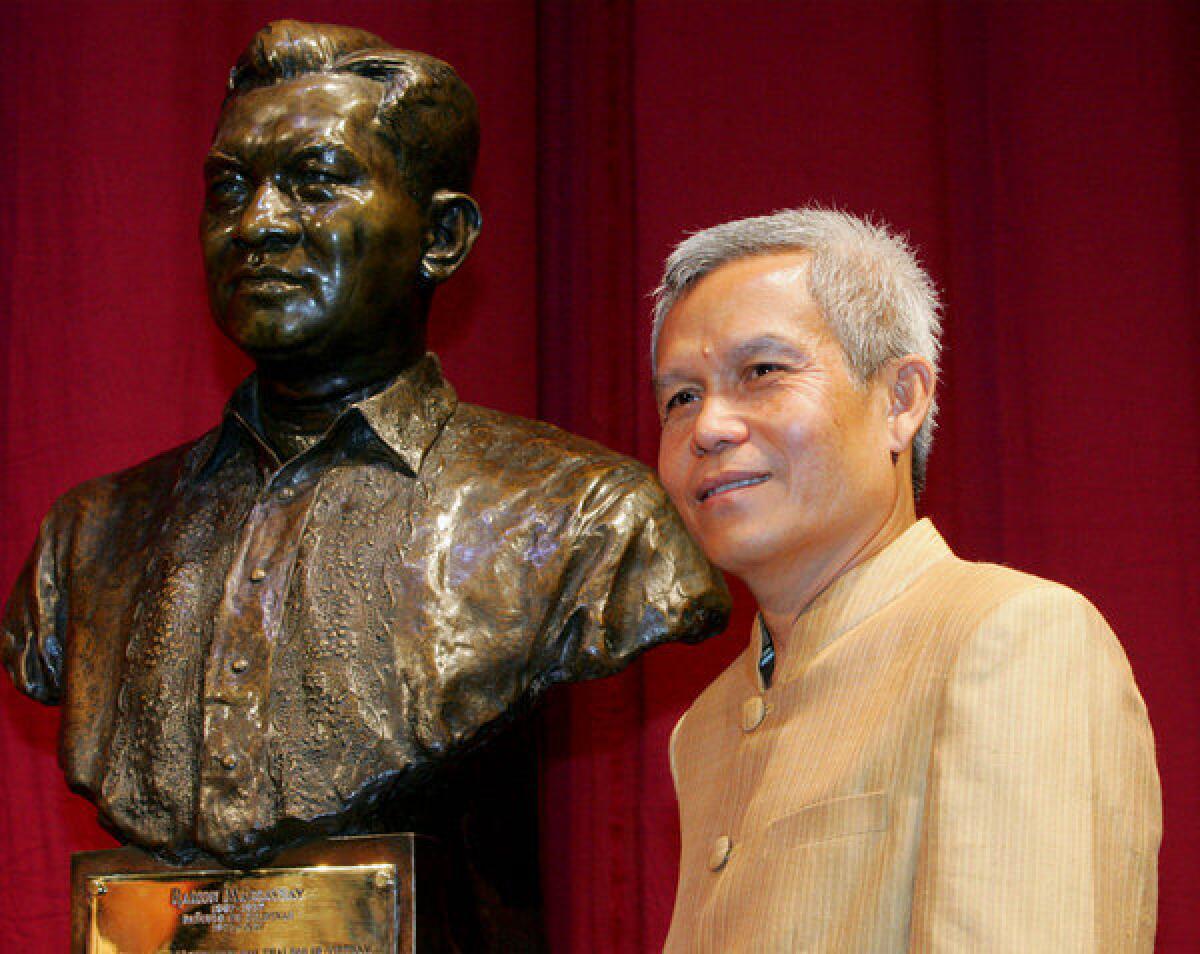Suspicions swirl over disappearance of activist in Laos

- Share via
Behind the wheel of her car, Ng Shui Meng last saw her husband in the jeep behind her, following her home for dinner on a Saturday night, she told human rights groups.
She lost sight of him somewhere near a police outpost. She came home. He did not.
The sudden disappearance of Lao activist Sombath Somphone, 60, has stirred fears for his fate. A grainy video of the Vientiane street where Sombath was last seen shows him being stopped and ultimately taken away, fueling suspicions that the government seized him.
But while Laos is the sort of country where something like that might happen, human rights groups say, it is unclear why it would happen to Sombath. His internationally recognized work centers on reducing poverty through sustainable development, but he is not especially critical of the Lao government.
Laos tried to dispel suspicion in a government statement issued this week, which said traffic police stopped Sombath in his jeep on Saturday night to check his license and car document under “normal procedures.” The Ministry of Foreign Affairs said the grainy security camera footage suggests Sombath may have been kidnapped afterward, perhaps because of a personal or business dispute.
Human rights activists were unconvinced, however, pointing out that police apparently did nothing to stop the supposed kidnapping near their own outpost. Human Rights Watch urged Laos to “come clean” on the disappearance of the respected activist.
“The clamor for his release is not going to go away,” said Brad Adams, its Asia director. “Lao authorities should immediately reveal his location and return him to his family.”
The Southeast Asian nation allows little dissent and ranks among the most repressive countries, according to the rights group Freedom House. The communist nation has gradually opened its economy, but freedom of speech and assembly are still tightly controlled. Shortly before Sombath disappeared, Lao officials reportedly expelled the head of a Swiss nonprofit organization for criticizing the state.
A coworker of Sombath’s told the Associated Press that the activist might have been detained for taking part in an October regional meeting of civil society and nonprofit groups by authorities who misconstrued it as a political act. The goals of such nonprofits are often at odds with those of the Lao government as it tries to peel off its “least developed country” label, embracing rapid and untrammeled economic growth.
His ties abroad are “probably the most alarming aspect of his work” for the Lao government, said Andrew Billo, assistant director for policy programs at the Asia Society. “Laos is increasingly engaging with the outside world. The government is increasingly nervous about that relationship.”
“They want the assistance -- but they also want to maintain their sovereignty as a nation,” Billo said. “If Sombath had some dialogue about the aid trajectory for the country, that would definitely be seen as a threat or a potential threat to the government.”
Sombath has unusually strong ties abroad as a Lao activist: He won a University of Hawaii scholarship as a young man and returned to Laos to launch a wide range of programs, from improving education to helping small businesses sell sustainable products such as organic mulberry tea. Seven years ago, he was awarded the Ramon Magsaysay Award, regarded by many as the Nobel Peace Prize of Asia.
“His hopes rest with the young,” the awards foundation wrote when the honor was announced. “He urges them to remain mindful of their country’s traditional values even as global forces grow stronger. Development is good, he assures them, but for development to be healthy, it ‘must come from within.’ ”
Pressure from Western human rights organizations and the U.S. State Department, which said Tuesday that it had registered its concerns with Lao officials, could ensure that Sombath is not detained indefinitely, as it might have been able to do a decade ago, Billo said.
But “they need to be careful,” Billo added. “They don’t want to alienate Laos altogether because it has alternative allies in the region they can call on for support,” such as China. “They can’t let the country off the hook. It’s a delicate tightrope balance between engagement and holding the country accountable.”
ALSO:
U.N. Security Council approves military mission in Mali
East Asian elections over but territorial disputes still simmer
GOP lawmakers challenge plan to correct diplomatic security flaws
More to Read
Sign up for Essential California
The most important California stories and recommendations in your inbox every morning.
You may occasionally receive promotional content from the Los Angeles Times.













